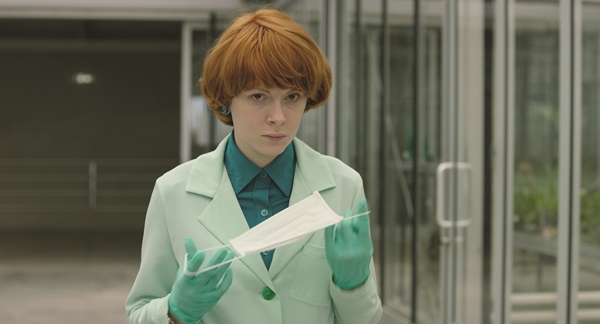
Little Joe is an attempt at sci-fi with stinging social commentary, but it actually is the longest, dreariest adaptation of Invasion of the Body Snatchers imaginable. Writer/director Jessica Hausner has no interest in sustaining suspense and tension. What she is focused on is creating a sterile, unnerving atmosphere, but that’s not enough to stave off the overly deliberate pacing; the flat, muted acting and lazy scriptwriting.
Alice Woodard is a cutting-edge plant technologist who has engineered a flower whose scent is designed to induce happiness. She is under immense pressure to deliver something that will win a flower competition in the coming year. In order to achieve this particular scent, she uses an illegal genome that renders the plant, named Little Joe after her teenage son, sterile. She’s divorced and lives with the actual Joe (Kit Conor) and, though she loves the boy, she’s somewhat resentful of the time parenting drains from her work.
All is well and good until the dog of one botanist comes in contact with the plant and starts behaving strangely. Its owner, Bella (Kerry Fox), ends up having to put the dog down. Meanwhile, Alice breaks the rules and brings home a Little Joe for her son. Eventually, Bella warns Alice that the plants are changing the personalities of the people who smell them. Alice waves this forewarning off, because a) it’s crazy and b) she’s required to in this genre. After an insufferable amount of time, she comes around but by then (cue ominous music) it may be too late.
Hausner has a fully developed sense of style, and the film looks great. The production design is impeccable, and cinematographer Martin Gschlacht has some smooth moves. The first time we see the camera steadily panning over a greenhouse full of seductive looking red flowers is ominously effective, but by the fifth time, we get the sense that the filmmakers are running out of ideas. And speaking of style, the performances are deliberately muted. The movie has a very British tone in the sense that emotions are deliberately kept at bay. (The actors are British, the director Austrian.) We run into a problem when characters worriedly exclaim that those they love have changed, considering we, the audience, haven’t noticed a difference.
The explanation that Bella posits is that since these flowers are sterile, they’ve found another way to survive by manipulating humans to help them propagate. In return, we feel happier. However, until the end, the most distinct expression of that emotion is someone who would really like to give someone else a flower. It’s pretty low stakes all around.
Emily Beecham, as Alice, does a very, very good job of filling in the blanks of her character, and there are many, many blanks. Though we are never privy to Alice’s private thoughts, we have scenes with a therapist where she feels comfortable in unloading her feelings. Everyone else is flat as they try to inhabit this numb world that Hausner has dropped them into.
Everyone save for Kerry Fox, as Bella. The role seems like an extraordinarily convenient plot device and the most egregious example of an extraneous character. Her sole purpose is to be the voice of doom: Bella adds up all the clues off screen and then occasionally tromps on camera to warn Alice of her findings. Fox is the Nicolas Cage of the film, chewing everything she can find. I believe it is in the service of Hausner’s message about conformity and happiness, given that Bella is the only honest, emotionally available character, yet that message is so muted and muddled that I wasn’t particularly interested in un-muddling it.






Leave A Comment